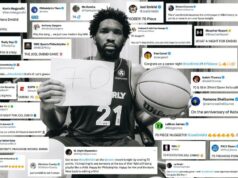“The last two years, we lost money. That had not been true before. The CBA we had, which  ended June 30, was progressively getting worse, 22 teams losing $450 million the year before almost the same amount. San Antonio just got there a little later. Fortunately, Tim Duncan showed up, we had David Robinson before that, and we won some championships and played deep into the playoffs. That helped cover some of the losses. If we had not had that situation, we would have been losing money before these last two years.”
ended June 30, was progressively getting worse, 22 teams losing $450 million the year before almost the same amount. San Antonio just got there a little later. Fortunately, Tim Duncan showed up, we had David Robinson before that, and we won some championships and played deep into the playoffs. That helped cover some of the losses. If we had not had that situation, we would have been losing money before these last two years.”
That’s San Antonio Spurs owner Peter Holt gave that stunning admission last week after talks broke down again between the NBA and the player’s union. The statement itself really isn’t that stunning, particularly given the tenor of the NBA owners for the last year when they were talking about the CBA. But for it to come from the owner of a club that had won four titles in the last 12 years is pretty stunning. You ask most experts around the league who the best run organization is and they’ll tell you it’s the Spurs. If they don’t they’ll probably tell you it’s Oklahoma City, who has modeled themselves after the San Antonio system. So yeah, the system needs to be fixed. Here’s the question though: would Peter Holt have taken the position he currently holds in labor negotiations had they taken place before Holt decided to dip in to the luxury tax by trading for Richard Jefferson?
At the time, it was tough to criticize against the trade for Jefferson. The Spurs had been knocked out of the first round of the playoffs pretty handily by the Mavericks the previous spring and were lacking any scoring punch from any player not named Duncan, Ginobili or Parker. Jefferson was coming off a career year scoring wise and seemed like the perfect fourth option for a team that lacked an athletic wing since Sean Elliott. They also gave up very little to get him Bruce Bowen, Fabricio Oberto and Kurt Thomas had all been solid to great contributors in the past for the Spurs, but were past their prime at this point. So despite the large of amount of money Jefferson had left on his deal, it seemed like a no brainer for the Spurs to pull the trigger.
However, year one of the Richard Jefferson project didn’t go well.
The Spurs did get past the first round the next season, but overall it was a bumpy season for both the Spurs and Jefferson. This was also the first year the Spurs reported a loss in income. Miraculously, Jefferson opted out of the $15 million left on his deal, but resigned with the Spurs for a 4 year, $40 million deal, which felt like a reach when he signed it. Last season went better for the Spurs and was marginally better for Jefferson, though he started out much better than he finished. The Spurs again lost money on the season and they also had a disappointing early playoff exit.
This was the first time the Spurs had made a costly personnel error since Holt took ownership. That isn’t to say this is the first error, but the Luis Scola trade and the team’s affinity (see 2003-2007) for drafting and stashing European players through the mid-2000’s didn’t force the Spurs into the luxury tax. The Jefferson trade and then resigning showed Peter Holt and R.C. Buford first hand that smaller markets have an incredibly small margin for error when it comes to taking risks on big money guys.
Meanwhile, the Spurs two biggest rivals, the Lakers and Mavericks, have won the last three NBA titles by outspending everyone, while each also having the fortune of having one of the five to ten best players in the league. Peter Holt knows he doesn’t have a top ten player and he doesn’t have the money to keep making mistakes till he hits on the right player or players (see Mavs signing Brendan Haywood, trade for Caron Butler, sign Shawn Marion and trade for Tyson Chandler). Which is why Holt, according to Alex Kennedy of Hoopsworld.com, one of the owners holding up any deal with the player’s union.
“Paul Allen, Peter Holt, Wyc Grousbeck, Robert Sarver and Dan Gilbert are all hard-liners,” said one NBPA source. “They are stopping the progress.”
I never want to see Peter Holt’s name next to Robert Sarver or Dan Gilbert’s again. This tells me that he’s either a cheap skate like Sarver or a vindictive a-hole like Gilbert. Before last week, most of us assumed Holt was a player friendly owner who wasn’t afraid to spend within reason. That was two years ago before he green lit the Richard Jefferson deal. Now, maybe that’s not the case. This summer, the Spurs reportedly made Tony Parker available for a lottery pick, but only if that team also took back Richard Jefferson’s contract and traded George Hill in part because they were going to have to extend him for some pretty good money (they also got a top 10 talent in Kawhi Leonard). So either Holt, with the help of Buford, realized they don’t have the right pieces to keep competing or they decided they need to be a little less player friendly and a little more cap friendly.
The next few weeks are going to be crucial for the future of the Spurs. It’s going to determine whether they can stay competitive and profitable even after Duncan retires. Peter Holt is front and center in determining that future. Now we just have to wait and see how much he’s going to let recent history affect how he negotiates with the players from here on out.





